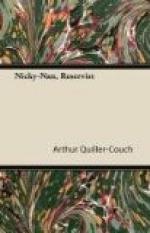CHAPTER XXI.
FAIRY GOLD.
“So you see, Mary-Martha, that for once in a way you were wrong and I was right.”
“You’re too fond of sweepin’ statements, Charity Oliver. I doubt your first, and your second I not only doubt but deny. So far as I remember, I said the man was probably in German pay, while you insisted that he’d won the money in a lottery.”
“I didn’t insist: I merely suggested. It was you who started to talk about German money: and I answered you that, even if the money was German, there might be an innocent way of explaining it before you took upon yourself to warn the police.”
Mrs Polsue glanced at her friend sharply. “You seem to be gettin’ very hot over it,” was her comment. “Why, I can’t think. You certainly wouldn’t if you gave any thought to your appearance.”
“I’m not hot in the least,” hotly protested Miss Oliver. “I’m simply proving to you that you’ve made a mistake: which you could never in your life bear to be told. The money is English gold, with King George the Something’s head on it: and that you can’t deny, try as you may.”
“All the more reason why it shouldn’t come through a German lottery,” replied Mrs Polsue, examining the coin.
“I tell you for the last time that I only threw lotteries out as a suggestion. There’s many ways to come into a fortune besides lotteries. You can have it left to you by will, for instance—”
“Dear, dear! . . . But never mind: go on. How one lives and learns!”
“And the other day the papers were full of a man who came into tens of thousands through what they call a Derby sweep. I remember wondering how cleaning chimneys—even those long factory ones—could be so profitable in the north of England, until it turned out that a sweep was some kind of horse-race.”
“The Derby, as it is called,” said Mrs Polsue, imparting information in her turn, “is the most famous of horse-races, and the most popular, though not the most fashionable. It is called the Blue Ribbon of the Turf.”
“Indeed? Now that’s very gratifying to hear,” said Miss Oliver. “I didn’t know they ran any of these meetings on teetotal lines.”
“As I was saying,” her friend continued, “the gowns worn are not so expensive as at Ascot, and I believe there is no Royal Enclosure. But the Derby is nevertheless what they call a National Institution. As you know, I disapprove of horse-racing as a pastime: but my brother-in-law in the Civil Service used to attend it regularly, from a sense of duty, with a green veil around his hat.”
“I suppose he didn’t want to be recognised?” Miss Oliver hazarded.




